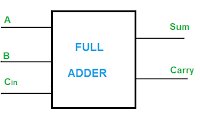Full Adder
Truth Table:
Circuit Diagram:
Sum = A XOR B XOR C_in
C_out = A.B + B.C_in + A.C_in
C_out = A.B + B.C_in + A.C_in
Program in C:
#include <stdio.h>
typedef char bit;
bit Cout=0;
bit fulladd(bit A ,bit B,bit Cin){
Cout=(A&B)||(Cin&(A^B));
return (A^B)^Cin;
}
int main()
{
int i,j,k;
int result;
printf("A B Cin | S Cout\n");
for(i=0;i<2;i++)
{
for(j=0;j<2;j++)
{
for(k=0;k<2;k++)
{
result=fulladd(i,j,k);
printf("%d %d %d | ",i,j,k);
printf("%d %d\n",result,Cout);
}
}
}
return 0;
}
Output:
A B Cin | S Cout
0 0 0 | 0 0
0 0 1 | 1 0
0 1 0 | 1 0
0 1 1 | 0 1
1 0 0 | 1 0
1 0 1 | 0 1
1 1 0 | 0 1
1 1 1 | 1 1
--------------------------------
Process exited after 0.1661 seconds with return value 0
Press any key to continue . . .
Program in C++:
#include <iostream>
using namespace std;
typedef char bit;
bit fulladd(bit A ,bit B,bit Cin,bit D){
if(D==0)
return (A&B)||(Cin&(A^B));
else
return (A^B)^Cin;
}
int main()
{
int i,j,k;
int result,Cout;
cout<<"A B Cin | S Cout\n";
for(i=0;i<2;i++)
{
for(j=0;j<2;j++)
{
for(k=0;k<2;k++)
{
Cout=fulladd(i,j,k,0);
result=fulladd(i,j,k,1);
cout<<i<<" "<<j<<" "<<k<<" | ";
cout<<result<<" "<<Cout<<"\n";
}
}
}
return 0;
}
Output:
A B Cin | S Cout
0 0 0 | 0 0
0 0 1 | 1 0
0 1 0 | 1 0
0 1 1 | 0 1
1 0 0 | 1 0
1 0 1 | 0 1
1 1 0 | 0 1
1 1 1 | 1 1
--------------------------------
Process exited after 0.1661 seconds with return value 0
Press any key to continue . . .



Comments :
Post a Comment